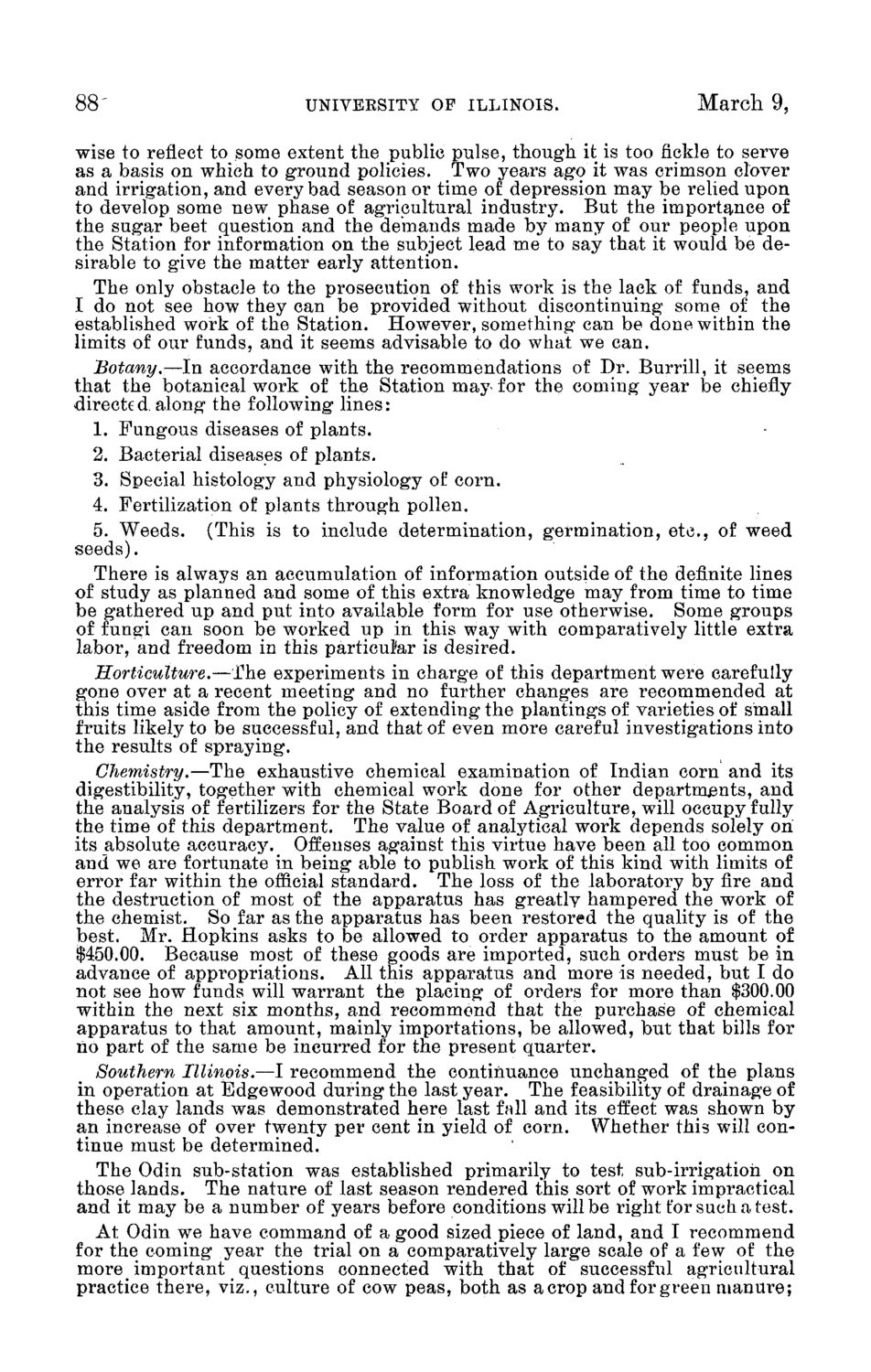| |
| |
Caption: Board of Trustees Minutes - 1898
This is a reduced-resolution page image for fast online browsing.

EXTRACTED TEXT FROM PAGE:
88' UNIVEESITY O F I L L I N O I S . M a r c h 9, wise to reflect to some extent the public pulse, though it is too fickle to serve as a basis on which to ground policies. Two years ago it was crimson clover and irrigation, and every bad season or time of depression may be relied upon to develop some new> phase of agricultural industry. But the importance of the sugar beet question and the demands made by many of our people upon the Station for information on the subject lead me to say that it would be desirable to give the matter early attention. The only obstacle to the prosecution of this work is the lack of funds, and I do not see how they can be provided without discontinuing some of the established work of the Station. However, something can be done within the limits of our funds, and it seems advisable to do what we can. Botany.—In accordance with the recommendations of Dr. Burrill, it seems that the botanical work of the Station may for the coming year be chiefly directed, along the following lines: 1. Fungous diseases of plants. 2. Bacterial diseases of plants. 3. Special histology and physiology of corn. 4. Fertilization of plants through pollen. 5. Weeds. (This is to include determination, germination, etc., of weed seeds). There is always an accumulation of information outside of the definite lines of study as planned and some of this extra knowledge may from time to time be gathered up and put into available form for use otherwise. Some groups of fungi can soon be worked up in this way with comparatively little extra labor, and freedom in this particular is desired. Horticulture.—The experiments in charge of this department were carefully gone over at a recent meeting and no further changes are recommended at this time aside from the policy of extending the plantings of varieties of small fruits likely to be successful, and that of even more careful investigations into the results of spraying. Chemistry.—The exhaustive chemical examination of Indian corn and its digestibility, together with chemical work done for other departments, and the analysis of fertilizers for the State Board of Agriculture, will occupy fully the time of this department. The value of analytical work depends solely on its absolute accuracy. Offenses against this virtue have been all too common and we are fortunate in being able to publish work of this kind with limits of error far within the official standard. The loss of the laboratory by fire and the destruction of most of the apparatus has greatly hampered the work of the chemist. So far as the apparatus has been restored the quality is of the best. Mr. Hopkins asks to be allowed to order apparatus to the amount of $450.00. Because most of these goods are imported, such orders must be in advance of appropriations. All this apparatus and more is needed, but I do not see how funds will warrant the placing of orders for more than $300.00 within the next six months, and recommend that the purchase of chemical apparatus to that amount, mainly importations, be allowed, but that bills for no part of the same be incurred for the present quarter. Southern Illinois.—I recommend the continuance unchanged of the plans in operation at Edgewood during the last year. The feasibility of drainage of these clay lands was demonstrated here last fall and its effect was shown by an increase of over twenty per cent in yield of corn. Whether this will continue must be determined. The Odin sub-station was established primarily to test sub-irrigation on those lands. The nature of last season rendered this sort of work impractical and it may be a number of years before conditions will be right for such a test. At Odin we have command of a good sized piece of land, and I recommend for the coming year the trial on a comparatively large scale of a few of the more important questions connected with that of successful agricultural practice there, viz., culture of cow peas, both as acrop andforgreeu manure;
| |